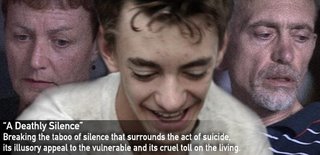
Reporter: Quentin McDermott
Broadcast: 15/05/2006
In the hours before he killed himself in April last year, Campbell Bolton wrote a long note in which he told his family how sorry he was for the pain he was about to cause them. "It fills me with grief when I think of what I have done to you," he wrote.
Nobody doubts he meant it. But, absorbed in his own pain, 17-year-old Campbell could not have comprehended the intensity and the breadth of suffering that he would inflict on others... his parents and brother, veering between sadness and anger, his extended family, friends, his school community, and the anonymous strangers - the emergency and morgue workers who had to handle his shattered body and tell a mother her son was dead.
"He didn’t have any idea of the grief," says Campbell's grandmother. "It's like a ripple in a pool, throwing a stone in a pool."
Now think of hundreds of stones being hurled into a pool, and the ripple effect. When Campbell Bolton died he became one of about 2,000 Australians who deliberately kill themselves each year, a tally that exceeds the huge but humdrum toll of road deaths. On average, one young person, like Campbell, dies by suicide every day. They're statistics to most people - but not to loved ones and the countless others who are touched by suicide.
Four Corners looks for insight into this social catastrophe by exploring the promising life and wasteful death of Campbell Bolton. On the surface nothing was wrong; Campbell came from a high-achieving, middle-class family with no background of drug abuse, violence, psychiatric illness or divorce.
He was a funny, charismatic and extremely clever young man. "Come speech night, he's basically falling over with prizes," a friend says. In Campbell's last months, however, as HSC exams approached, his academic performance slipped dramatically. No one could tell what was wrong.
This Four Corners report does not seek to answer exactly why Campbell ended his life. However it does identify some issues that were occupying him, including hissexuality and an acne problem. It now seems, with benefit of hindsight, that Campbell also had an abstract, intellectual attraction to suicide.
In making this program, Four Corners has sought to avoid glamourising Campbell's death or apportioning blame. Without the courage of Campbell's family, friends and school, the program could not have been made. All who knew him are victims of his death.
"The reason we're doing this program is that there's a deathly silence around suicide," says Campbell's mother Merridy. "Everybody's shocked and everyone says, 'Oh isn't it terrible'... but then the conversation stops."
I watched this program last night and i admit it was slightly disturbing but incrediably insightful. So if you don't have time, please make some and read at least parts of the transcrpt here.
No comments:
Post a Comment